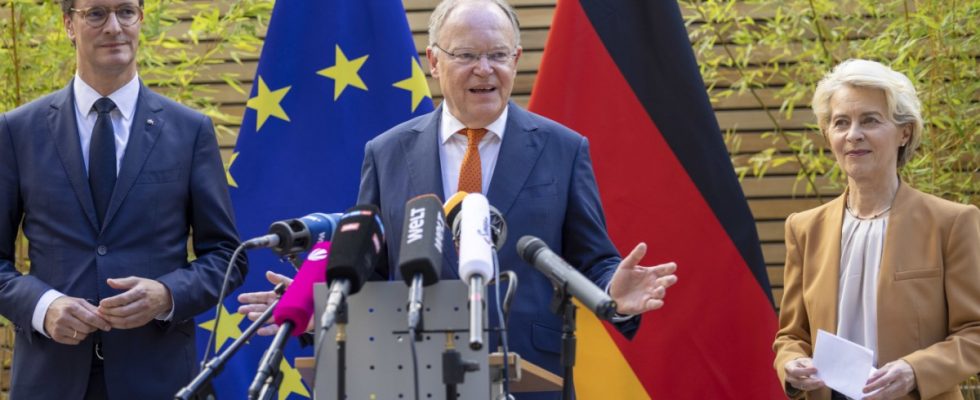In demonstrative unity, the 16 Prime Ministers are demanding a “bridge electricity price” in Germany. The demand is part of a “Brussels Declaration” that they adopted on Thursday during a two-day visit to Brussels.
The text states that the European Union should allow member states to provide state electricity price subsidies for a transitional period, “especially for energy-intensive companies that compete internationally.” Otherwise there would be massive economic damage. But the real message goes to the federal government: they would first have to submit a concept to Brussels for approval. The Greens in Berlin are for it, the FDP is against it, and Chancellor Olaf Scholz (SPD) is skeptical.
For the first time since 2018, the country heads traveled together to Brussels to represent their interests there. They spoke with Commission President Ursula von der Leyen (CDU) and other representatives of the EU executive. Lower Saxony’s Prime Minister Stephan Weil described the appearance as “remarkably closed and remarkably clear”.
The SPD politician is currently chairman of the Prime Minister’s Conference and always appeared in Brussels side by side with his co-chair Hendrik Wüst (CDU), his North Rhine-Westphalian counterpart. The alliance is obviously intended as a contrast to the often arguing traffic light coalition, which does not always appear united in Brussels.
When it comes to migration, the explanation remains vague
The “Brussels Declaration”, a kind of list of demands for the EU institutions, is based on the concern that more and more citizens are losing trust in the ability of European politics to act. The EU therefore needs to get two problems under control in particular: the increasing number of refugees and the economic crisis.
In order not to endanger unanimity, the topic of migration is kept vague in the declaration. But in the discussions, the country leaders across party lines described to the EU representatives in drastic terms how many municipalities are reaching the brink of their ability to act because of the acceptance of an increasing number of migrants. The paper is formulated all the more clearly when it comes to the Green Deal, the climate program of the EU Commission under von der Leyen: From now on, it is important to take greater account of the international competitiveness of the industry and to ensure that it is not accepted by the population to lose.
The concerns about energy-intensive companies were presented to the President of the Commission “very urgently,” said Stephan Weil. He named the sectors steel, chemicals, copper, aluminum, ceramics and cement. The “core area of the German economy” is no longer competitive because of electricity prices. Not only industry, but also small and medium-sized businesses should be helped.
Weil did not want to see a contradiction to his party colleague Olaf Scholz. The Chancellor does not want unlimited subsidies, and a “bridge electricity price” is limited until sufficient renewable energy is available. Regarding concerns that a German electricity price subsidy could distort competition in Europe, Weil said: “No one in Europe will become stronger if Germany becomes weaker.”
Approval by the EU Commission can take a long time
However, according to the Commission’s strict state aid criteria, this is not an argument. It would have to examine and approve a German electricity price subsidy, which could take a long time. The EU institutions are also currently negotiating an EU electricity market reform that will redefine the scope for state market intervention. With this in mind, EU MP Michael Bloss (Greens) is calling for a Europe-wide solution instead of going it alone at national level. “We definitely need a European approach,” he said, warning of an intra-European subsidy race.
Hendrik Wüst said in Brussels that the German economy needs help as quickly as possible. Month after month, jobs were lost and investments for the future withdrew. In addition to the bridge electricity price, Wüst called for a reduction in electricity tax. “Nothing is more expensive than continuing to wait,” said Wüst, when asked about the financing of electricity subsidies.
Regarding the Chancellor’s offer to conclude a “Germany Pact” across party lines in view of the crisis, Wüst said in an interview with Deutschlandfunk that people “like to take the Chancellor at his word if he wants to work on the big issues.” Meanwhile, the Chancellery offered CDU leader Friedrich Merz a conversation with Chancellor Olaf Scholz about the pact on Thursday.

